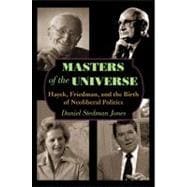
Note: Supplemental materials are not guaranteed with Rental or Used book purchases.
Purchase Benefits
What is included with this book?
| Acknowledgments | p. ix |
| Timeline | p. xi |
| List of Abbreviations | p. xiii |
| Introduction | p. 1 |
| The Three Phases of Neoliberalism | p. 6 |
| Neoliberalism and History | p. 10 |
| Transatlantic Neoliberal Politics | p. 15 |
| The Postwar Settlement | p. 21 |
| The 1940s: The Emergence of the Neoliberal Critique | p. 30 |
| Karl Popper and "The Open Society" | p. 37 |
| Ludwig von Mises and "Bureaucracy" | p. 49 |
| Friedrich Hayek and "The Road to Serfdom" | p. 57 |
| The Mont Pelerin Society and "The Intellectuals and Socialism" | p. 73 |
| The Rising Tide: Neoliberal Ideas in the Postwar Period | p. 85 |
| The Two Chicago Schools: Henry Simons, Milton Friedman, and Neoliberalism | p. 89 |
| The Enlightenment, Adam Smith and Neoliberalism | p. 100 |
| Economic and Political Freedom: Milton Friedman and Cold War Neoliberalism | p. 111 |
| The German Economic Miracle: Neoliberalism and the Soziale Marktwirtschaft | p. 121 |
| Regulatory Capture, Public Choice, and Rational Choice Theory | p. 126 |
| A Transatlantic Network: Think Tanks and the Ideological Entrepreneurs | p. 134 |
| The United States in the 1950s: Fusionism and the Cold War | p. 138 |
| British Conservatism in the 1950s | p. 147 |
| Neoliberal Organization in the 1950s and 1960s | p. 152 |
| ' The Second Wave: Free Market Think Tanks in the 1970s | p. 161 |
| Neoliberal Journalists and Politicians | p. 173 |
| Breakthrough? | p. 178 |
| Keynesianism and the Emergence of Monetarism, 1945-71 | p. 180 |
| Keynes and Keynesianism | p. 182 |
| "A Little Local Difficulty": Enoch Powell's Monetarism | p. 190 |
| American Economic Policy in the 1960s | p. 197 |
| Milton Friedman's Monetarism | p. 201 |
| The Gathering Storm | p. 212 |
| Economic Strategy: The Neoliberal Breakthrough, 1971-84 | p. 215 |
| The Slow Collapse of the Postwar Boom, 1964-71 | p. 217 |
| Stagflation and Wage and Price Policies | p. 225 |
| The Heath Interregnum and the Neoliberal Alternative | p. 230 |
| The Left Turns to Monetarism, 1: Callaghan, Healey and the IMF Crisis | p. 241 |
| The Left Turns to Monetarism, 2: Jimmy Carter and Paul Volcker's Federal Reserve | p. 247 |
| Thatcherite Economic Strategy | p. 254 |
| Reaganomics | p. 263 |
| Conclusion | p. 269 |
| Neoliberalism Applied? The Transformation of Affordable Housing and Urban Policy in the United States and Britain, 1945-2000 | p. 273 |
| Postwar Low-Income Housing and Urban Policy in the United States | p. 278 |
| Postwar Low-Income Housing and Urban Policy in Britain | p. 288 |
| Jimmy Carter and the Limits of Government | p. 295 |
| Property-Owning Democracy and Individual Freedom: Housing and Neoliberal Ideas | p. 297 |
| The Reagan Administration | p. 304 |
| Council House Privatization: The Right to Buy Scheme | p. 308 |
| Transatlantic Transmissions: Reagan's Enterprise Zones | p. 315 |
| Hope VI, Urban Regeneration, and the Third Way | p. 321 |
| Conclusion | p. 325 |
| Conclusion: The Legacy of Transatlantic Neoliberalism: Faith-Based Policy | p. 329 |
| Parallelisms: The Place of Transatlantic Neoliberal Politics in History | p. 333 |
| The Apotheosis of Neoliberalism? | p. 338 |
| Reason-Based Policymaking | p. 343 |
| Notes | p. 347 |
| Index | p. 391 |
| Table of Contents provided by Ingram. All Rights Reserved. |
The New copy of this book will include any supplemental materials advertised. Please check the title of the book to determine if it should include any access cards, study guides, lab manuals, CDs, etc.
The Used, Rental and eBook copies of this book are not guaranteed to include any supplemental materials. Typically, only the book itself is included. This is true even if the title states it includes any access cards, study guides, lab manuals, CDs, etc.